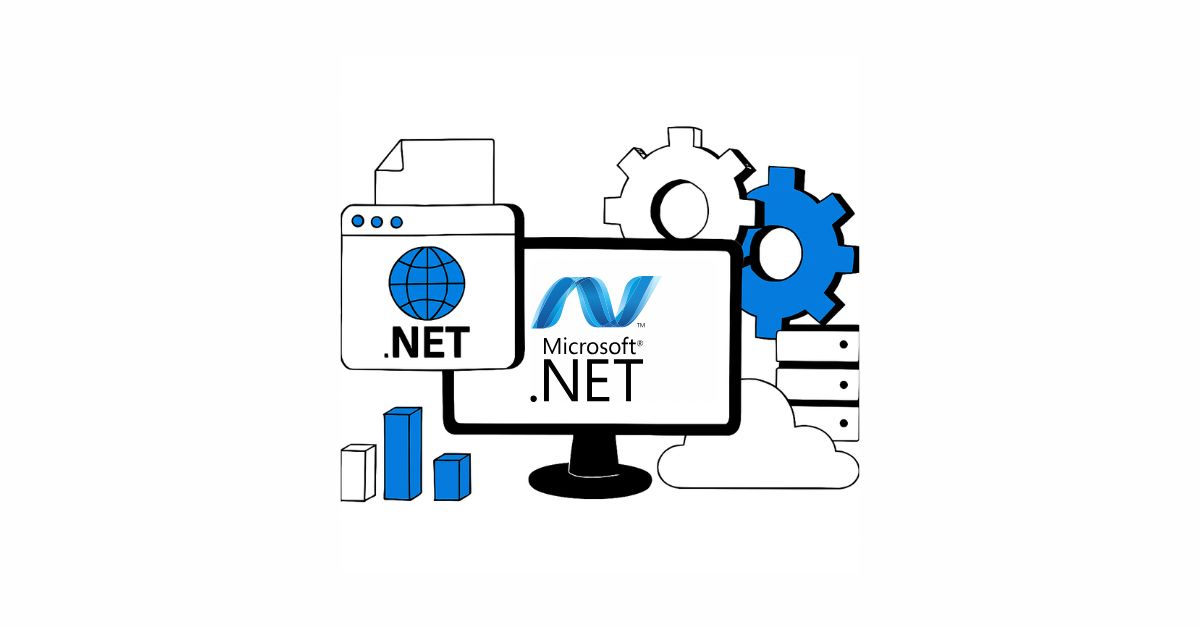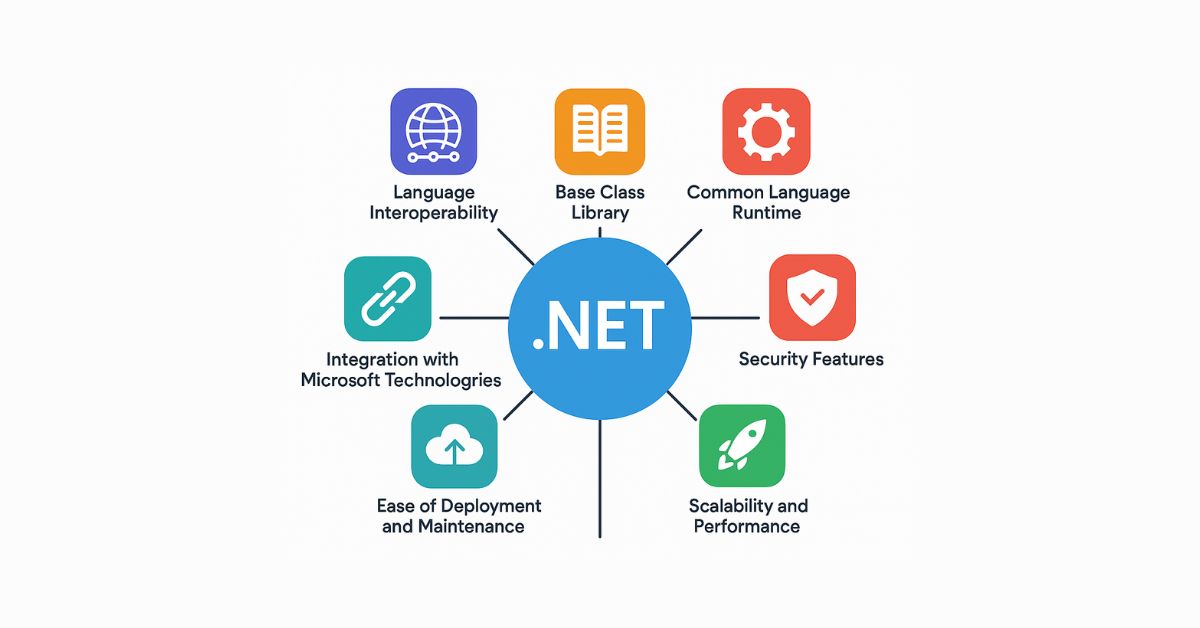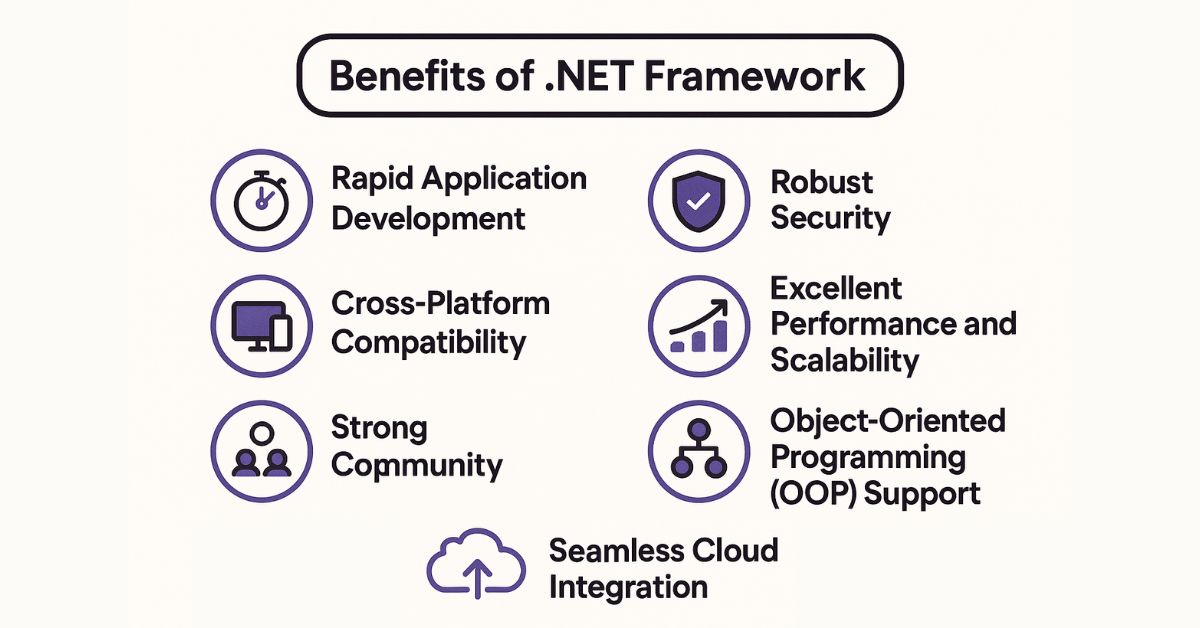Top 7 Benefits and Features of the .NET Framework



The .NET Framework is a powerful, versatile, and time-tested software development platform developed by Microsoft. It has been the backbone of countless enterprise-level and desktop applications for years, offering developers a reliable and robust environment to build, deploy, and maintain scalable applications. In this blog, we’ll dive deep into the top features of .NET framework, explore the benefits of .NET Framework, and touch upon its core components that make it a favorite among developers and businesses alike.
The .NET Framework is a software development platform for building and running Windows applications. It supports programming languages like C#, VB.NET, and F#. The framework was introduced by Microsoft in the early 2000s. It provides a controlled environment for developing applications, making it easier to manage memory, security, and performance.
Whether you are building a small desktop app or a large-scale enterprise solution, the .NET Framework offers a consistent object-oriented programming environment.

Let’s start by exploring the most compelling .NET features that set it apart:
One of the most remarkable features of .NET Framework is its support for language interoperability. Developers can write code in multiple languages and integrate them seamlessly. This flexibility allows teams to work with their language of choice without worrying about compatibility issues.
The BCL includes a wide array of reusable classes, interfaces, and value types. It also includes libraries for file I/O, database connectivity, web development, data structures, and more. The availability of this pre-written code accelerates development and ensures consistency.
At the heart of the framework lies the CLR. It provides important services such as memory management, thread management, exception handling, and garbage collection. The CLR ensures that applications run smoothly and securely, regardless of the language used to build them.
In today’s digital world, security is a major concern. The .NET Framework includes built-in security features like code access security (CAS) and role-based security, which help protect applications from unauthorized access and malicious code execution.
.NET applications are easier to deploy thanks to features like no-impact applications, private components, controlled code sharing, and side-by-side versioning. Maintenance is also simpler because of the managed code environment and automatic memory management.
Whether you’re developing a small app or a large enterprise system, the .NET Framework scales effortlessly. It offers high performance thanks to features like just-in-time (JIT) compilation, native optimization, and caching services.
The .NET Framework integrates seamlessly with other Microsoft products such as SQL Server, Azure, Office, and more. This makes it an ideal choice for businesses already embedded in the Microsoft ecosystem.
Understanding the components of .NET is essential for appreciating its full power:

Now that we’ve covered the main features, let’s explore the practical benefits of .NET Framework that make it a go-to for developers and businesses:
Thanks to a comprehensive library and robust IDEs like Visual Studio, developers can quickly prototype and develop applications. This shortens the time-to-market for products and reduces development costs.
Though traditionally a Windows-based framework, .NET has evolved into a cross-platform environment with the introduction of .NET Core and now .NET 5/6+. Developers can now build apps for Windows, Linux, and macOS.
With millions of developers worldwide, the .NET community is vibrant and resourceful. Whether you’re looking for tutorials, tools, or troubleshooting help, there’s no shortage of support.
Built-in security mechanisms ensure your application is well-protected against common vulnerabilities. This is particularly crucial for enterprise applications that handle sensitive data.
.NET applications are known for their high performance, thanks to features like JIT compilation and runtime optimization. These aspects make it easier to scale applications as user demands grow.
.NET is built on OOP principles, which help in managing complexity in larger projects and enhance reusability, scalability, and maintainability of code.
With Microsoft Azure, integrating your .NET applications into the cloud is seamless. This is a significant benefit in today’s era of cloud-first solutions and microservices architecture.
The combination of robust .NET features and enterprise-grade scalability makes it a preferred choice for organizations around the globe. Businesses find it easy to build secure, scalable, and high-performance applications, especially when working with a reliable .NET development company.
Moreover, many organizations leverage .NET for their legacy systems while also preparing for the future with .NET Core and .NET 6+, providing a smooth migration path without starting from scratch.
The .NET Framework continues to be a leading choice in the world of application development due to its comprehensive set of features, rich libraries, and secure runtime environment. The features of .NET Framework—such as language interoperability, security, and ease of deployment—paired with the benefits of .NET Framework, like scalability and rapid development, make it ideal for both startups and large enterprises.
Whether you’re building web applications, desktop software, or enterprise solutions, the .NET Framework provides everything you need to succeed. With evolving support and a growing ecosystem, now is the perfect time to embrace the capabilities of .NET for your next project.